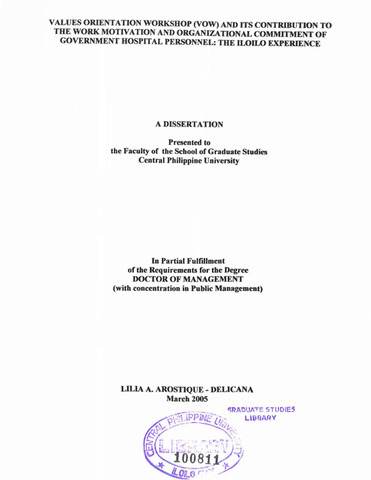Values Orientation Workshop (VOW) and its contribution to the work motivation and organizational commitment of government hospital personnel: The Iloilo experience
Abstract
It was the overall goal of this study to determine the contribution or influence of VOW on work motivation and organizational commitment of government hospital personnel in Iloilo. It also aimed to determine and compare the levels of knowledge, values integration, work motivation and organizational commitment of respondents according to their VOW attendance, and to analyze the relationship between VOW participation and levels of knowledge, values integration, work motivation and organizational commitment.
This study is descriptive correlational. It made use of both quantitative and qualitative approaches. A self-administered questionnaire was prepared and used to gather quantitative data while focus group discussions (FGD) was employed to gather qualitative data. The respondents were 596 government hospital personnel of 15 government hospitals in Iloilo; half of whom attended VOW and the other half did not. FGD participants were the chief nurses and supervisors of these respondents.
The data show that the hospital personnel were in their prime with an average age of 38.5 years, mostly women, married, college graduate, and had served the hospital for less than 11 years. One-half belong to salary grade category of less than 10. Six in ten were medical service personnel, and the rest belonged to the administrative services. This is expected since the organization where the respondent’s work is a hospital.
In general, the level of knowledge on VOW core values ofgovernment hospital personnel was high. Personnel who participated in VOW had a higher mean rating in comparison to those who did not participate. It shows that VOW attendance gives the participants an edge over the non-participants in the level of knowledge on the core values “Pagka-tao”, “Pagka-kalikasan”, “Pagka-tagapaglingkod”, “Pagka-Filipino”.
The advantage in the level of knowledge of those who attended VOW over those who did not attend is statistically significant among those who were 42-52 years old, female, who have served 11 years and above, and those belonging to salary grade 18- 24.
Among the administrative personnel, VOW attendance gave those top and middle level managers, those who served the hospital for more than 11 years, and the top salaried personnel, an edge over their non-VOW counterparts.
On the specific value “Pagka-tao”, hospital personnel who attended VOW had better level of knowledge compared to those who did not. A significant difference in the level of knowledge was found among personnel with post baccalaureate degrees in favor of those who attended VOW.
On the core value “Pagka-kalikasan”, the level of knowledge of VOW participants was significantly better for those who did not attend VOW over those who attended among personnel in age bracket 42-52 years and those with the highest educational attainment.
As a whole, a significant difference in the level of knowledge on the core value “Pagka-tagapaglingkod”, was observed in favor of those who participated in VOW, specifically for those in age group 42 years and above, married, college graduates, both categories of length of service, in all levels of salary grade and in the medical services.
A significant difference in the level of knowledge was also found on the core value “Pagka-Filipino”, between those who attended VOW and those who did not, in favor of the former, among personnel in the 42-52 years age group, salary grade 18-24, and those in the medical services.
The hospital personnel appreciated most the following values: “fairness in dealing with clients regardless of creed, color or ethnic background”, “trees help sustain life support system in this planet and provide fresh air”, the slogan “mamamayan muna, hindi mamaya na”; and “the country’s welfare should be over and above one's personal interest”.
In general the level of integration of the VOW core values among hospital personnel was moderately strong. A significant difference exists between those with VOW and those without VOW in favor of the latter implying that even if hospital personnel who have not attended VOW, they have integrated these values into their way of life.
Those with VOW have significantly higher level of integration of core value “Pagkakalikasan”, than those without VOW among the personnel with 11 years or more length of service. On the contrary among respondents belonging to the administrative services, those who did not attend VOW have a significantly higher level of integration than those who attended VOW.
Furthermore significant differences were found in the level of integration of the core value “Pagka-tagapaglingkod”, between personnel who attended VOW and those who did not in favor of the former, specifically among females, those who have served for 11 years or more, those with salary grade 10-17 and in the medical services.
The data further show a significantly lower level of integration of the core value “Pagka-Filipino” was observed among personnel who attended VOW than those who did not. This was true among females, and those who have served for 11 years or more.
The hospital personnel chose “having time to maintain good relationship with their family and hospital staff even if they are busy with their hospital work” to be the core value “Pagka-tao” which was of greatest help to them in their job. Furthermore, they also chose, “planting as many trees as possible every time they have the opportunity,” to be the core value “Pagka-kalikasan”, which was of greatest help to them as a hospital worker. They also specified that “a willingness to come for duty anytime their service is needed”, is an important core value under “Pagkatagapaglingkod”. On the other hand, they also declared the importance of “the willingness to do community service for the good of the country even if they will be staying away from their families”, a core value embodied in “Pagka-Filipino”.
Findings of the study further show that in general, hospital personnel were moderately motivated to work with those who did not attend VOW registering higher mean rating over those who attended VOW. A significant difference in the mean rating in favor of those without VOW was noted among the personnel who were single, with less than salary grade 10, and those in the administrative services. This result suggests that attendance in VOW did not give the participants an advantage in the level of motivation over those who did not participate in VOW.
In general the hospital personnel were moderately committed to their organization. No significant difference in the level of organizational commitment was noted between the ratings of those who have attended VOW and those who have not, regardless of categories of identified variables.
Although most of the respondents, regardless of VOW participation exhibited high level of knowledge in all core values namely “Pagka-tao”, “Pagka-kalikasan”, “Pagka-tagapaglingkod”, and “Pagka-Filipino”, no significant relationship was found between respondents’ VOW participation and their level of knowledge on core values.
The analysis of relationship further revealed that the personnel’s attendance in VOW was significantly related to the level of integration of the core values “Pagkakalikasan” and “Pagka-Filipino”, but not of the core values “Pagka-tao” and “Pagkatagapaglingkod”.
A significant relationship was also found between respondents participation in VOW and their level of work motivation, but not in their level of organizational commitment.
A significant relationship was found between level of values integration, level of work motivation and level of organizational commitment Further, a statistically significant relationship was likewise noted between level of knowledge on core values and level of work motivation, and level of knowledge on core values and organizational commitment when core values integration was controlled.
A positive relationship was also noted between hospital personnel’s level of work motivation and level of organizational commitment. This indicates that a highly motivated personnel is also a highly committed worker.
The FGD results disclosed specific positive changes among hospital personnel who had attended VOW, such as “open relationship with their superior and peers”, “observance of waste segregation and no smoking”, “punctuality and willingness to work extra hours”, “being solicitous and facilitative with clients”, and “awareness of things Filipino”. These positive changes, however were short-lived, specifically among rank and file, but sustained among college graduates.
From the findings, the researcher concludes that the government hospital personnel possess high level of knowledge on core values, “Pagka-tao”, “Pagkakalikasan”, Pagka-tagapaglingkod”, and “Pagka-Filipino”. This high level of knowledge was further enhanced by their attendance in VOW.
The hospital personnel appreciated most, “the quality time spent with their family and co-workers despite their hectic schedule”, “the importance of trees in their lives as source of fresh air and other life-sustaining materials”, “serving hospital clients better and more professionally”, and “prioritizing the welfare of the country over one’s personal interest”.
Level of integration of the core values of those who have participated in VOW and those who have not was moderately strong. However, VOW participation significantly influenced only the integration of core value “Pagka-kalikasan”, specifically among those who had served the hospital for 11 years or more; and of the core value “Pagka-tagapaglingkod” among females, with longer length of service, with salary grade 10-17 and among medical services personnel.
VOW participation did seem to promote a higher level of work motivation and organizational commitment of hospital personnel. The program is able to inculcate in them an intensity to engage in work-related activities to satisfy their needs and goals as well as those of the organization but it is not capable of generating enough loyalty I order for them to remain in the hospital in the future.
Integration of core values “Pagka-kalikasan”, and “Pagka-Filipino” was positively changed with personnel’s participation in VOW.
Knowledge in core values is not significantly related to its integration, nor to work motivation or organizational commitment. However, when the influence of integration of core values is controlled, knowledge in core values is significantly related to work motivation. In like manner, this knowledge in core values was also significantly related to organizational commitment when integration of core values is controlled.
The stronger the level of personnel’s work motivation, the stronger is his organizational commitment.
The chief nurses and supervisors noted the positive changes in the behavior of their personnel after VOW participation which even somehow permeated to those who have not attended. However, these changes seem to be short-lived and unsustained, particularly by the rank and file but not necessarily among the college graduates.
Considering the findings of the study and the conclusions drawn, the researcher recommends the continuance of VOW program involving all government personnel to that the thrust to establish a strong moral foundation among government workers, will be realized. It is further recommended that the VOW training be redesigned to meet the needs of the personnel with lower educational attainment.
The researcher also recommends a longer VOW training period to possibly effect integration of core values. It not possible, then a regular weekly or monthly schedule may be planned out by the government offices. It is possible, that core value integration was not efficiently attained during VOW training because of weak strategy in the delivery of knowledge. Hence, it is recommended that innovative strategies for VOW lecturers be developed to enhance learning and integration.
Taking into consideration that this study evaluated VOW after it was conducted, it is further recommended that an impact study be done with an evaluation design that should include baseline data.
Description
Abstract only
Suggested Citation
Delicana, L. A. A. (2005). Values Orientation Workshop (VOW) and its contribution to the work motivation and organizational commitment of government hospital personnel: The Iloilo experience (Unpublished Doctoral dissertation). Central Philippine University, Jaro, Iloilo
Type
DissertationSubject(s)
Keywords
Department
School of Graduate StudiesDegree
Doctor of Management major in Public ManagementShelf Location
GSL Theses 650.072 D379
Physical Description
xxi, 206 leaves




